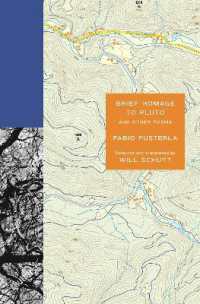- ホーム
- > 洋書
- > 英文書
- > Philosophy
Full Description
Challenges accepted beliefs that Confucianism is a cause of women's oppression and explores Confucianism as an ethical system compatible with gender parity.
Confucianism and Women argues that Confucian philosophy-often criticized as misogynistic and patriarchal-is not inherently sexist. Although historically bound up with oppressive practices, Confucianism contains much that can promote an ethic of gender parity. Attacks on Confucianism for gender oppression have marked China's modern period, beginning with the May Fourth Movement of 1919 and reaching prominence during the Cultural Revolution of the 1960s and 1970s. The West has also readily characterized Confucianism as a foundation of Chinese women's oppression. Author Li-Hsiang Lisa Rosenlee challenges readers to consider the culture within which Confucianism has functioned and to explore what Confucian thought might mean for women and feminism.
She begins the work by clarifying the intellectual tradition of Confucianism and discussing the importance of the Confucian cultural categories yin-yang and nei-wai (inner-outer) for gender ethics. In addition, the Chinese tradition of biographies of virtuous women and books of instruction by and for women is shown to provide a Confucian construction of gender. Practices such as widow chastity, footbinding, and concubinage are discussed in light of Confucian ethics and Chinese history. Ultimately, Rosenlee lays a foundation for a future construction of Confucian feminism as an alternative ethical ground for women's liberation.
Contents
Acknowledgments
1. Introduction
2. Confucianism, Chinese-ness, and Ren Virtuous Personhood
Confucians before Confucius: Ru and Its Ambiguity
Ru, State, and Chinese-ness
Defining Ru: Ren as Confucian Virtue Ethics
3. Yin-Yang, Gender Attributes, and Complementarity
Yin-yang and the Oppositional Binary of Femininity-masculinity
Yin-yang and Correlative Cosmology
Yin-yang Complementarity and Gender Hierarchy
4. Nei-Wai, Gender Distinctions, and Ritual Propriety
Nei-wai, Ritualization, and Civilization
Nei-wai, Functional Distinctions, and Gender Hier-archy
5. Didactic Texts for Women and the Womanly Sphere of Nei
Lienuzhuan, Guifan, and the Tradition of Virtuous Women's Biographies
The Four Books for Women and by Women
The Question of Female Literacy and the Virtue of Women's Speech (Fuyan)
6. Chinese Sexism and Confucianism
Gender Oppression and Confucian Virtue Ethics
Case Studies: Widowhood and Footbinding
7. Toward a Confucian Feminism— Feminist Ethics In-the-Making
The Problems of Gender and the Politics of Femi-nism
Outline of a Confucian Feminism: A Hybrid Identity
Reflections and Conclusions
Notes
Bibliography
Index






